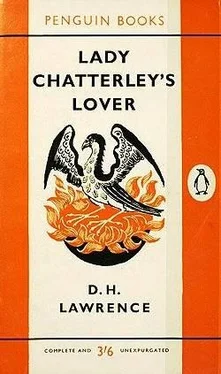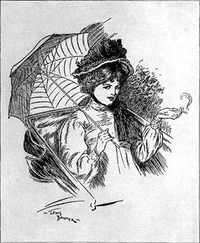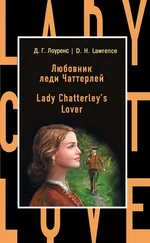Their host was a heavy, rather coarse Scotchman who had made a good fortune in Italy before the war, and had been knighted for his ultrapatriotism during the war. His wife was a thin, pale, sharp kind of person with no fortune of her own, and the misfortune of having to regulate her husband's rather sordid amorous exploits. He was terribly tiresome with the servants. But having had a slight stroke during the winter, he was now more manageable.
The house was pretty full. Besides Sir Malcolm and his two daughters, there were seven more people, a Scotch couple, again with two daughters; a young Italian Contessa, a widow; a young Georgian prince, and a youngish English clergyman who had had pneumonia and was being chaplain to Sir Alexander for his health's sake. The prince was penniless, good-looking, would make an excellent chauffeur, with the necessary impudence, and basta! The Contessa was a quiet little puss with a game on somewhere. The clergyman was a raw simple fellow from a Bucks vicarage: luckily he had left his wife and two children at home. And the Guthries, the family of four, were good solid Edinburgh middle class, enjoying everything in a solid fashion, and daring everything while risking nothing.
Connie and Hilda ruled out the prince at once. The Guthries were more or less their own sort, substantial, but boring: and the girls wanted husbands. The chaplain was not a bad fellow, but too deferential. Sir Alexander, after his slight stroke, had a terrible heaviness his joviality, but he was still thrilled at the presence of so many handsome young women. Lady Cooper was a quiet, catty person who had a thin time of it, poor thing, and who watched every other woman with a cold watchfulness that had become her second nature, and who said cold, nasty little things which showed what an utterly low opinion she had of all human nature. She was also quite venomously overbearing with the servants, Connie found: but in a quiet way. And she skilfully behaved so that Sir Alexander should think that he was lord and monarch of the whole caboosh, with his stout, would-be-genial paunch, and his utterly boring jokes, his humourosity, as Hilda called it.
Sir Malcolm was painting. Yes, he still would do a Venetian lagoonscape, now and then, in contrast to his Scottish landscapes. So in the morning he was rowed off with a huge canvas, to his 'site'. A little later, Lady Cooper would he rowed off into the heart of the city, with sketching-block and colours. She was an inveterate watercolour painter, and the house was full of rose-coloured palaces, dark canals, swaying bridges, medieval facades, and so on. A little later the Guthries, the prince, the countess, Sir Alexander, and sometimes Mr Lind, the chaplain, would go off to the Lido, where they would bathe; coming home to a late lunch at half past one.
The house-party, as a house-party, was distinctly boring. But this did not trouble the sisters. They were out all the time. Their father took them to the exhibition, miles and miles of weary paintings. He took them to all the cronies of his in the Villa Lucchese, he sat with them on warm evenings in the piazza, having got a table at Florian's: he took them to the theatre, to the Goldoni plays. There were illuminated water-fetes, there were dances. This was a holiday-place of all holiday-places. The Lido, with its acres of sun-pinked or pyjamaed bodies, was like a strand with an endless heap of seals come up for mating. Too many people in the piazza, too many limbs and trunks of humanity on the Lido, too many gondolas, too many motor-launches, too many steamers, too many pigeons, too many ices, too many cocktails, too many menservants wanting tips, too many languages rattling, too much, too much sun, too much smell of Venice, too many cargoes of strawberries, too many silk shawls, too many huge, raw-beef slices of watermelon on stalls: too much enjoyment, altogether far too much enjoyment!
Connie and Hilda went around in their sunny frocks. There were dozens of people they knew, dozens of people knew them. Michaelis turned up like a bad penny. 'Hullo! Where you staying? Come and have an ice-cream or something! Come with me somewhere in my gondola.' Even Michaelis almost sun-burned: though sun-cooked is more appropriate to the look of the mass of human flesh.
It was pleasant in a way. It was almost enjoyment. But anyhow, with all the cocktails, all the lying in warmish water and sunbathing on hot sand in hot sun, jazzing with your stomach up against some fellow in the warm nights, cooling off with ices, it was a complete narcotic. And that was what they all wanted, a drug: the slow water, a drug; the sun, a drug; jazz, a drug; cigarettes, cocktails, ices, vermouth. To be drugged! Enjoyment! Enjoyment!
Hilda half liked being drugged. She liked looking at all the women, speculating about them. The women were absorbingly interested in the women. How does she look! what man has she captured? what fun is she getting out of it?—The men were like great dogs in white flannel trousers, waiting to be patted, waiting to wallow, waiting to plaster some woman's stomach against their own, in jazz.
Hilda liked jazz, because she could plaster her stomach against the stomach of some so-called man, and let him control her movement from the visceral centre, here and there across the floor, and then she could break loose and ignore 'the creature'. He had been merely made use of. Poor Connie was rather unhappy. She wouldn't jazz, because she simply couldn't plaster her stomach against some 'creature's' stomach. She hated the conglomerate mass of nearly nude flesh on the Lido: there was hardly enough water to wet them all. She disliked Sir Alexander and Lady Cooper. She did not want Michaelis or anybody else trailing her.
The happiest times were when she got Hilda to go with her away across the lagoon, far across to some lonely shingle-bank, where they could bathe quite alone, the gondola remaining on the inner side of the reef.
Then Giovanni got another gondolier to help him, because it was a long way and he sweated terrifically in the sun. Giovanni was very nice: affectionate, as the Italians are, and quite passionless. The Italians are not passionate: passion has deep reserves. They are easily moved, and often affectionate, but they rarely have any abiding passion of any sort.
So Giovanni was already devoted to his ladies, as he had been devoted to cargoes of ladies in the past. He was perfectly ready to prostitute himself to them, if they wanted him: he secretly hoped they would want him. They would give him a handsome present, and it would come in very handy, as he was just going to be married. He told them about his marriage, and they were suitably interested.
He thought this trip to some lonely bank across the lagoon probably meant business: business being l'amore, love. So he got a mate to help him, for it was a long way; and after all, they were two ladies. Two ladies, two mackerels! Good arithmetic! Beautiful ladies, too! He was justly proud of them. And though it was the Signora who paid him and gave him orders, he rather hoped it would be the young milady who would select him for l'amore. She would give more money too.
The mate he brought was called Daniele. He was not a regular gondolier, so he had none of the cadger and prostitute about him. He was a sandola man, a sandola being a big boat that brings in fruit and produce from the islands.
Daniele was beautiful, tall and well-shapen, with a light round head of little, close, pale-blond curls, and a good-looking man's face, a little like a lion, and long-distance blue eyes. He was not effusive, loquacious, and bibulous like Giovanni. He was silent and he rowed with a strength and ease as if he were alone on the water. The ladies were ladies, remote from him. He did not even look at them. He looked ahead.
He was a real man, a little angry when Giovanni drank too much wine and rowed awkwardly, with effusive shoves of the great oar. He was a man as Mellors was a man, unprostituted. Connie pitied the wife of the easily-overflowing Giovanni. But Daniele's wife would be one of those sweet Venetian women of the people whom one still sees, modest and flower-like in the back of that labyrinth of a town.
Читать дальше
Конец ознакомительного отрывка
Купить книгу

![Дэвид Лоуренс - Lady Chatterley's Lover [С англо-русским словарем]](/books/26613/devid-lourens-lady-chatterley-s-lover-s-anglo-thumb.webp)










